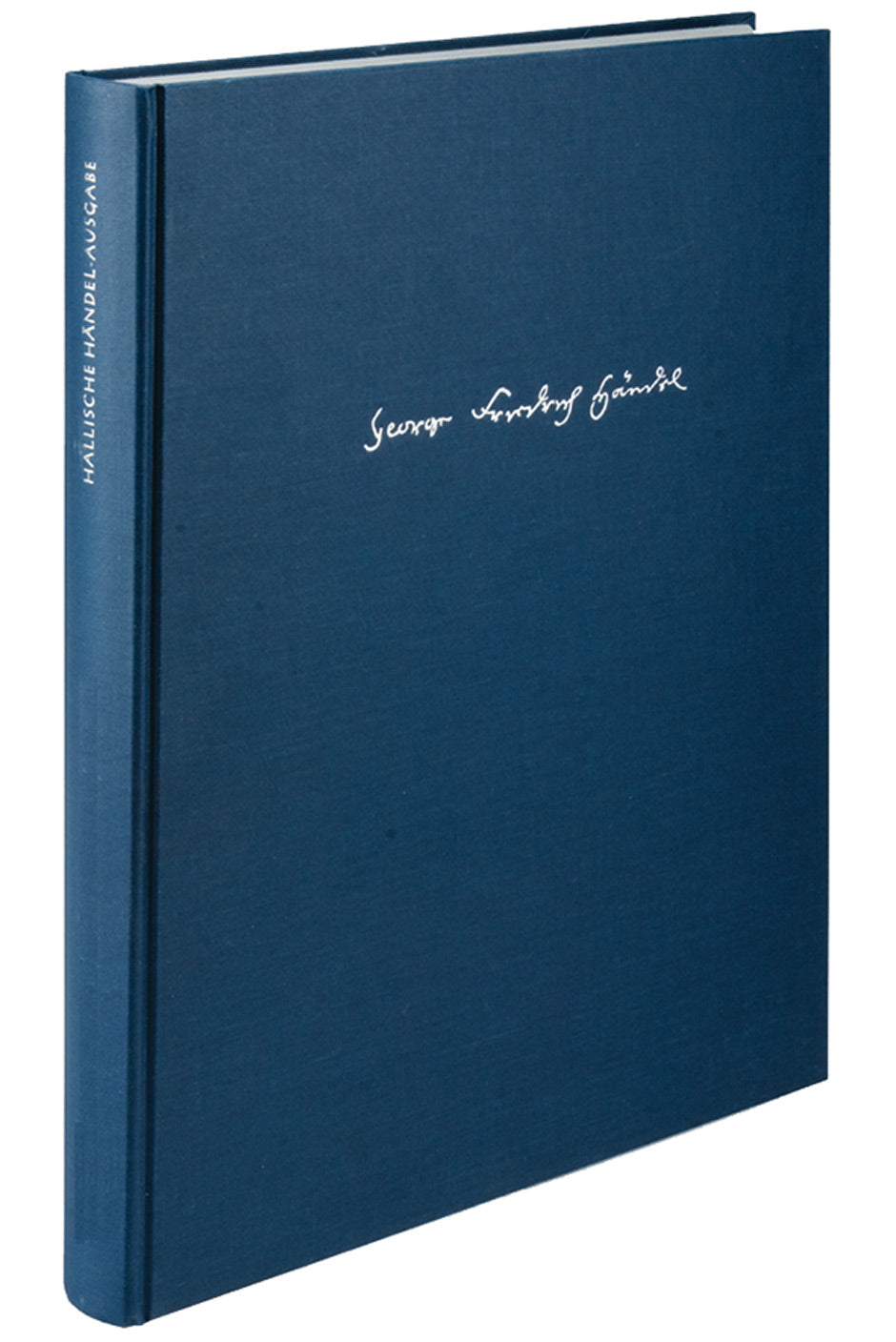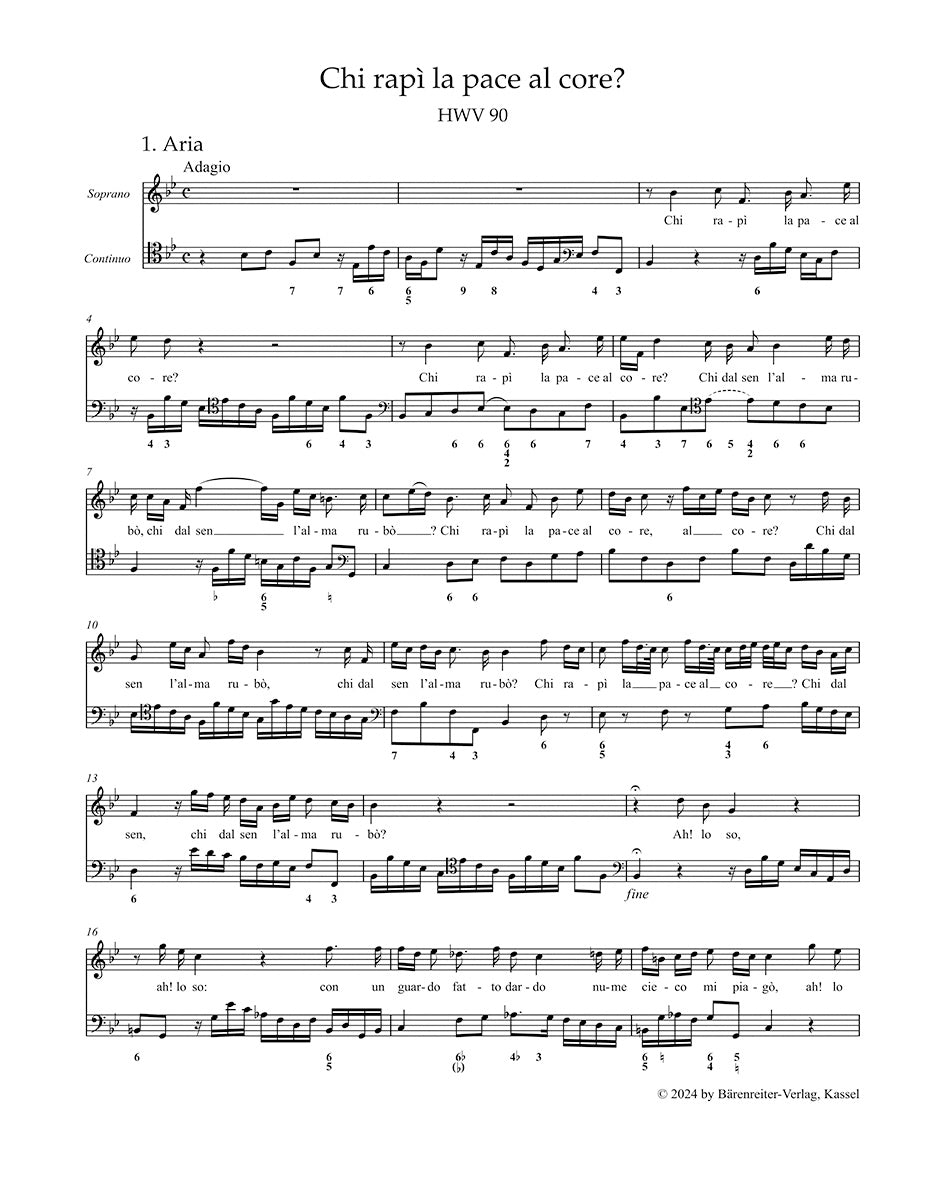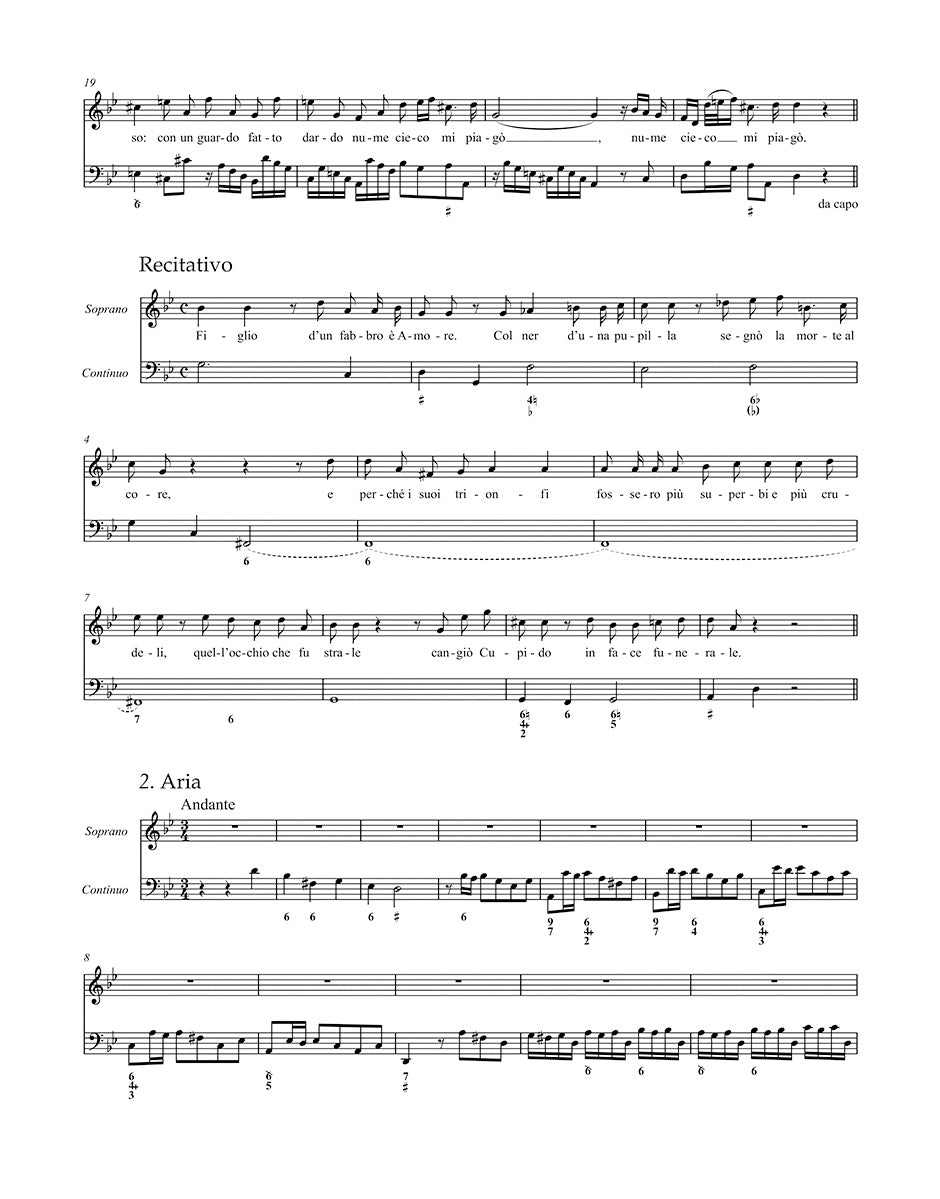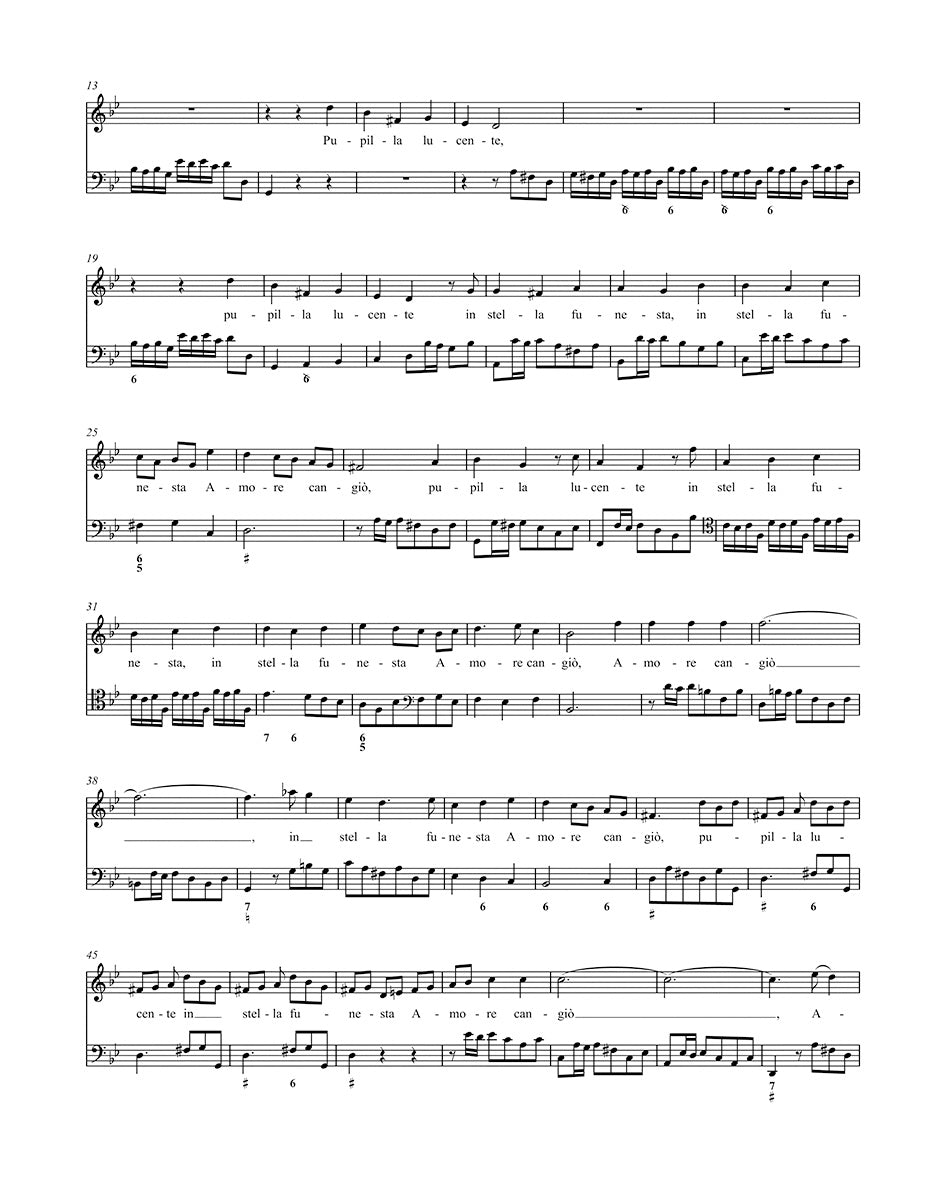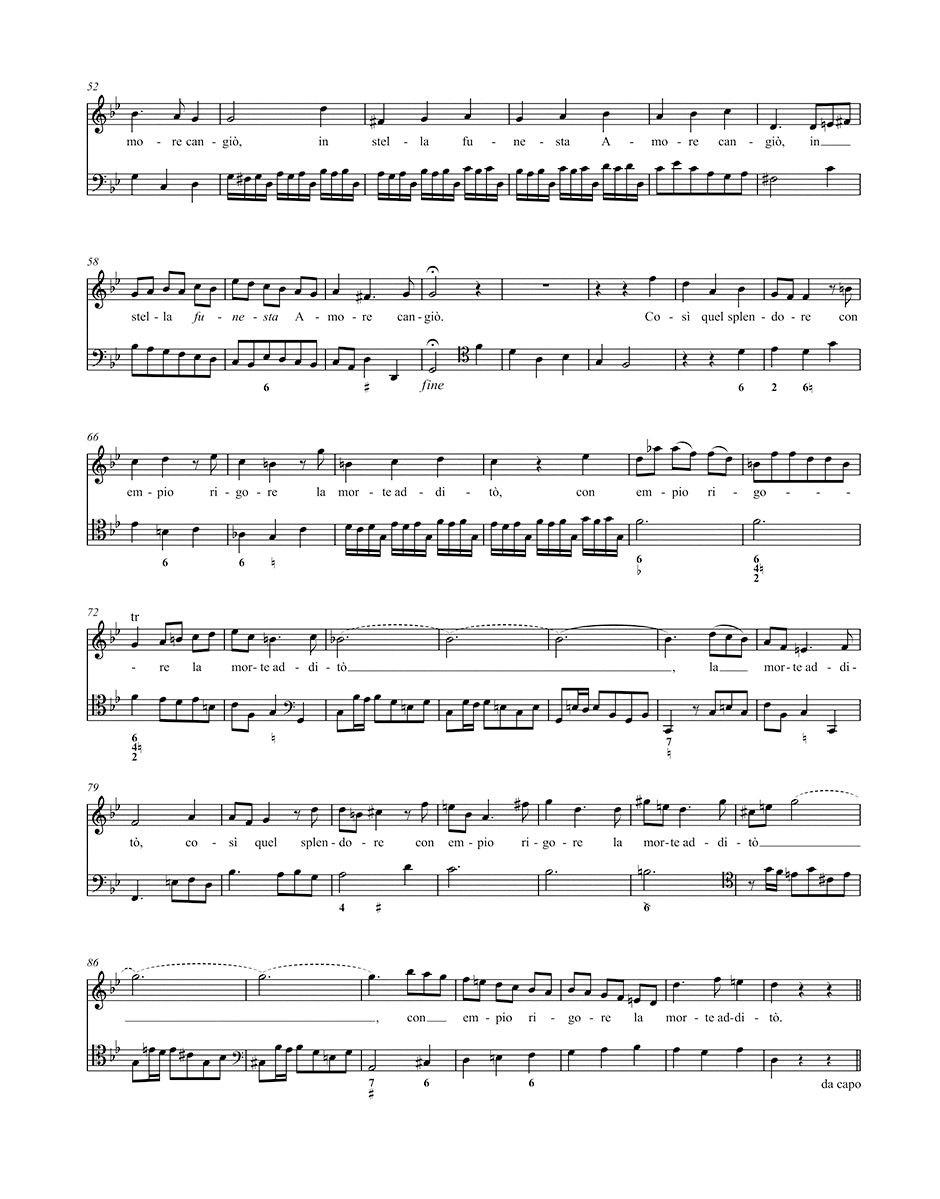Handel: Cantatas for solo voice and basso continuo
Halle Handel Edition (HHA) V/1.1
Expected to ship in about a week.
- Composer: George Frideric Handel (1685-1759)
- Editor: Andrew V. Jones
- Format: Full Score – Complete Edition
- Instrumentation: Voice, Basso continuo
- Binding: Hardcover
- Work Language: Italian
- ISMN:
- Size: 10.2 x 13.0 inches
- Pages: 165
- Urtext / Critical Edition
Description
Handel's cantatas for solo voice and basso continuo are jewels waiting to be discovered. They number over 80, and are probably the least known body of compositions that Handel wrote; their neglect is astonishing in view of the extraordinary technical skill and imagination that are displayed by a composer who (when he started writing cantatas) was in his early 20s. Not only the musical quality of the cantatas but also their variety are perhaps all the more surprising in view of Handel's most common starting-point: a poem expressing the love – usually unrequited – between nymphs and shepherds.
Handel's main place of residence from December 1706 onwards was Rome, and his chief patron was the Marquis Francesco Maria Ruspoli (1672–1731; Prince of Cerveteri from 1709). Ruspoli was a member of the "Accademia degli Arcadi" (or "Accademia dell'Arcadia"), a society that formed an important context for the composition of secular cantatas. Founded in Rome in 1690, it promoted the reform of Italian poetry and drew inspiration from the pastoral romance "Arcadia" by Jacopo Sannazaro and from the Eclogues of Virgil and the Idylls of Theocritus. The members of the Academy adopted pastoral names; Ruspoli's was Olinto, one of the characters in Handel's accompanied cantata "Olinto pastore, Tebro fiume, Gloria" (HWV 143), for which Ruspoli might have provided the poetry. in autumn 1705 Ruspoli took up residence in the Palazzo Bonelli. From 1707 onwards Handel's cantatas were first performed there at Ruspoli's weekly "conversazioni" on Sunday evenings.
It is clear from the huge number of manuscript transcriptions of Handel's cantatas that they were extremely popular in the eighteenth century, and their number was increased by the practice of transposition: a singer who found that the tessitura of a cantata lay outside her or his range might have asked the composer or (more often) a copyist to produce a version with a more convenient tessitura. If the composer himself were responsible for such a transposition, he produced a version that demonstrated creative re-thinking; if a copyist were responsible, the transposition was usually literal, and divergences from the original were likely to be careless errors. Most of Handel's cantatas contain two arias, each preceded by a recitative, producing an overall structure of recitative – aria – recitative – aria. in a few cantatas (e.g., HWV 104) the number of arias is extended to three. The voice for which Handel composed most of his cantatas was soprano; in addition, there are about sixteen for alto and two for bass.
Contents:
- Faksimiles
- The verbal texts of the cantatas with German and English translations
- Cantata ""Ah, che pur troppo è vero", HWV 77
- Recitativo: Ah, che pur troppo è vero
-
- Aria: Col partir la bella Clori
- Recitativo: In solitaria parte
-
- Aria: Care mura, a voi d'intorno
- Recitativo: Numi ingiusti, spietati, Amor tiranno
-
- Aria: Dacché perso ho la mia Clori
- Cantata ""Allor ch'io dissi addio", HWV 80
- Recitativo: Allor ch'io dissi addio
-
- Aria: Son qual cerva ferita che fugge
- Recitativo: Anzi se nacque il mio amoroso desio
-
- Aria: Il dolce foco mio
- Appendix I, HWV 80
- Recitativo: A: Anzi se nacque il mio amoroso desio
- Recitativo: B: Così l'amato oggetto
- Cantata "Aure soavi e liete", HWV 84a
- Recitativo: Aure soavi e liete
-
- Aria: Care luci, che l'alba rendete
- Recitativo: Pietà, Clori, pietà
-
- Arietta: Un'aura flebile
- Cantata "Aure soavi e liete", HWV 84b
- Recitativo: Aure soavi e liete
-
- Aria: Care luci, che l'alba rendete
- Recitativo: Pietà, Clori, pietà
-
- Arietta: Un'aura flebile
- Cantata "Bella ma ritrosetta", HWV 86
-
- Aria: Bella ma ritrosetta
- Recitativo: Oh quanto godo in rimirarti spesso
-
- Aria: Mi rido di veder
- Cantata "Care selve, aure grate", HWV 88
- Recitativo: Care selve, aure grate
-
- Aria: Ridite a Clori
- Recitativo: Se cangiar si potesse
-
- Aria: Non ha forza nel mio petto
- Cantata "Chi rapì la pace al core?", HWV 90
-
- Aria: Chi rapì la pace al core?
- Recitativo: Figlio d'un fabbro è Amore
-
- Aria: Pupilla lucente
- Cantata "Clori, degli occhi miei", HWV 91a
- Recitativo: Clori, degl'occhi miei, Clori, del cuore
-
- Aria: Quel bel rio, ch'a duro scoglio
- Recitativo: Ma d'un scoglio peggiore
-
- Aria: Quella che miri
- Cantata "Clori, degli occhi miei", HWV 91b
- Recitativo: Clori, degl'occhi miei, Clori, del cuore
-
- Aria: Quel bel rio, ch'a duro scoglio
- Recitativo: Ma d'un scoglio peggiore
-
- Aria: Quella che miri
- Cantata "Clori, Clori, ove sei?", HWV 93
- Recitativo: Clori, Clori, ove sei?
-
- Aria: Se gl'ascolti, ti diranno
- Recitativo: Né creder già che finto
-
- Aria: Dell'idol mio
- Cantata "Clori, vezzosa Clori", HWV 95
- Recitativo: Clori, vezzosa Clori
-
- Aria: Il bosco, il prato, il rio
- Recitativo: Come cervo ferito
- Appendix II, HWV 95
-
- Aria: Non è possibile
- 1a. Aria: Il bosco, il prato, il rio
- Recitativo: Se l'usignol canoro
- Cantata "Da sete ardente afflitto", HWV 100
- Recitativo: Da sete ardente afflitto
-
- Aria: Penso al rio, ma penso insieme
- Recitativo: Amanti, ecco vi svelo
-
- Aria: Quando non son presente
- Cantata "Dalla guerra amorosa", HWV 102a
- Recitativo: Dalla guerra amorosa
-
- Aria: Non v'alletti un occhio nero
- Recitativo: Fuggite, sì, fuggite!
-
- Aria: La bellezza è com'un fiore
-
- Recitativo: ed Arioso Fuggite, sì, fuggite!
- Cantata "Deh, lasciate e vita e volo", HWV 103
-
- Aria: Deh, lasciate e vita e volo
- Recitativo: Crudele, impara almen dalla compagna
-
- Aria: Lascia la dolce brama
- Cantata "Del bell'idolo mio", HWV 104
- Recitativo: Del bell'idolo mio
-
- Aria: Formidabil gondoliero
- Recitativo: Ma se non la rinvengo
-
- Aria: Piangerò, ma le mie lacrime
- Recitativo: Fra quell'orride soglie
-
- Aria: Su rendetemi colei
- Cantata "Dimmi, o mio cor, che brami", HWV 106
- Recitativo: Dimmi, o mio cor, che brami
-
- Aria: Mi piagò d'Amor lo strale
- Recitativo: Dunque se il rio destino e 'l crudo fato
-
- Aria: Cari lacci, amate pene
- Appendix III, HWV 106
- 2a. Aria: Cari lacci, amate pene
- Cantata "Ditemi, o piante, o fiori", HWV 107
- Recitativo: Ditemi, o piante, o fiori
-
- Aria: Il candore tolse al giglio
- Recitativo: Ma la beltà del volto
-
- Aria: Per formar sì vaga e bella
- Cantata "Dolc'è pur d'amor l'affanno", HWV 109a
-
- Aria: Dolc'è pur d'amor l'affanno
- Recitativo: Il viver sempre in pene
-
- Aria: Se più non t'amo
- Appendix IV, HWV 109a
- 1a. Aria: Dolc'è pur d'amor l'affanno
- Cantata "Dolc'è pur d'amor l'affanno"
-
- Aria: Dolc'è pur d'amor l'affanno
- Recitativo: Il viver sempre in pene
-
- Aria: Se più non t'amo
- Cantata "E partirai, mia vita?", HWV 111a
- Recitativo: E partirai, mia vita?
-
- Aria: Vedrò teco ogni gioia, ogni bene
- Recitativo: Vedrò d'ombre infelici
-
- Aria: Pria che spunti un dì sì fiero
- Cantata "E partirai, mia vita?", HWV 111b
- Recitativo: E partirai, mia vita?
-
- Aria: Vedrò teco ogni gioia, ogni bene
- Recitativo: Vedrò d'ombre infelici
-
- Aria: Pria che spunti un dì sì fiero
- Cantata "Figli del mesto cor", HWV 112
- Recitativo: Figli del mesto cor, pianti e sospiri
-
- Aria: Son pur le lacrime
- Recitativo: Così mia dura sorte
-
- Aria: Cruda legge d'un alma costante
- Recitativo: Volea seguir, quand'ecco
- Cantata "Filli adorata e cara", HWV 114
- Recitativo: Filli adorata e cara
-
- Aria: Se non giunge quel momento
- Recitativo: Ma se volesse mai mia cruda sorte
-
- Aria: Lungi da te, mia speme
- Cantata "Fra pensieri quel pensiero", HWV 115
-
- Aria: Fra pensieri quel pensiero
- Recitativo: E se fia che, volando
-
- Aria: Pronti l'ale dispiegate
- Appendix V, HWV 115
- 1a. Aria: Fra pensieri quel pensiero
- Cantata "Fra tante pene e tante", HWV 116
- Recitativo: Fra tante pene e tante
-
- Aria: Se avvien che sia infedele
- Recitativo: Torna, torna, mio bene
-
- Aria: A sanar le ferite d'un core
- Cantata "Hendel, non può mia musa", HWV 117
- Recitativo: Hendel, non può mia musa
-
- Aria: Puote Orfeo col dolce suono
- Recitativo: Dunque maggior d'Orfeo
-
- Aria: Ognun canti, e all'armonia
- Cantata "Ho fuggito Amore anch'io", HWV 118
-
- Aria: Ho fuggito Amore anch'io
- Recitativo: La dolce libertà
-
- Aria: È troppo bella
- Cantata "Irene, idolo mio", HWV 120a
- Recitativo: Irene, idolo mio, crudel Irene
-
- Aria: Tormento maggiore
- Recitativo: Talor che cerco, o Irene
-
- Aria: In tanti affanni
- Recitativo: Contro forza fatale
-
- Aria: Quanto più rigida
- Cantata "L'aure grate, il fresco rio, Fragment", HWV 121a
-
- Aria: L'aure grate, il fresco rio
- Recitativo: Non v'è delizia umana
-
- Aria: No, che piacer non v'è
- Cantata "L'aure grate, il fresco rio", HWV 121b
-
- Aria: L'aure grate, il fresco rio
- Recitativo: Non v'è delizia umana
-
- Aria: No, che piacer non v'è
- Cantata "Lungi, lungi da me, pensier tiranno!", HWV 125a
- Recitativo: Lungi, lungi da me, pensier tiranno!
-
- Aria: Pensier crudele
- Recitativo: Ma se amor ciò contrasta e il cor ripugna
-
- Aria: Fuggi da questo sen
- Recitativo: Non sa il mio cor sincero
-
- Aria: Tirsi amato, adorato mio nume
Publishers use a lot of words to describe what they sell, and we know it can be confusing. We've tried to be as clear as possible to make sure you get exactly what you are looking for. Below are descriptions of the terms that we use to describe the various formats that music often comes in.
Choral Score
A score for vocalists that only contains the vocal lines. The instrumental parts are not there for reference. Generally, cheaper than a vocal score and requires multiple copies for purchase.
Facsimile
Reproductions of the original hand-written scores from the composer.
Full Score
For ensemble music, this indicates that the edition contains all parts on a single system (there are not separate parts for each player). In larger ensembles, this is for the conductor.
Hardcover
Hardbound. Generally either linen-covered or half-leather.
Orchestral Parts
Similar to a wind set, this is a collection of parts. In the case of strings, the numbers listed are the number of copies included, though generally these are available individually (often with minimum quantities required).
Paperback
When publishers offer multiple bindings (e.g. hardcover) or study scores, this is the "standard" version. If you're planning to play the music, this is probably what you want.
Performance / Playing Score
A score of the music containing all parts on one system, intended for players to share. There are not separate parts for each player.
Set of Parts
For ensemble music, this indicates that there are separate individual parts for each player.
Solo Part with Piano Reduction
For solo pieces with orchestra, this is a version that contains a piano reduction of the orchestra parts. For piano pieces, two copies are typically needed for performance.
Study Score
A small (think choral size) copy of the complete score meant for studying, and not playing. They make great add-ons when learning concertos and small chamber works.
Vocal Score
A score prepared for vocalists that includes the piano/organ part or a reduction of the instrumental parts.
Wind Set
For orchestral music, this is a collection of wind and percussion parts. The specific quantities of each instrument are notated.
With Audio
In addition to the printed music, the edition contains recordings of the pieces. This may be an included CD, or access to files on the internet.
With / Without Fingering (Markings)
Some publishers prepare two copies - a pure Urtext edition that includes no fingering (or bowing) suggestions and a lightly edited version that includes a minimal number of editorial markings.
